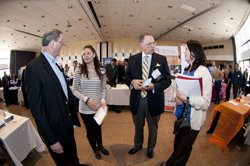“Racing into the Space Age: The Life, Scholarship, and Legacy of Dr. Walter S. McAfee,” was held on Friday, Feb. 5. The event honored the accomplishments of the African-American scientist.
The virtual event was organized by the Department of Educational Counseling and Leadership, the Department of History and Anthropology, the School of Science, and the Black History Month Planning Committee.
Steven Bachrach, Ph.D., Dean of the School of Science, gave opening remarks and announced the endowment of the Dr. Walter McAfee Scholarship in Science.
“[The scholarship] is a way to allow for Mcafee’s legacy to continue to live on and promote access to the sciences by under-represented students,” Bachrach said. “I’m thrilled to let everybody know that the scholarship has now been endowed with both gifts and pledges. It’s really thrilling to see you here and thank you in person, as well as to launch the kickoff of this scholarship and the effects that it will ripple on with.”
Walter Greason, Ph.D. Associate Professor and Chair of the Department of Educational Counseling and Leadership, provided a timeline of McAfee’s accomplishments and connections to Monmouth University.
Greason first learned about McAfee while combing through old yearbooks. “An older African-American’s picture kept appearing through the late 1950s and early 1970s, but his name was never listed,” Greason said. “I was mystified by who this faculty member was in electrical engineering. There’s no other sign or marker about what he was doing or how he was contributing to the University.”
The man was none other than Walter McAfee, a University faculty member for years at the height of the Civil Rights Movement.
“For me to start to introduce him today, and why his life and legacy carry so much importance, I do have to start with the work that I’ve done on the history of New Jersey and particularly the area around Monmouth University,” Greason said. “It wasn’t always a place dedicated to equal rights and equal justice for everyone. This is a really profound moment in the 1920s when the Ku Klux Klan dominated the Jersey Shore, so just a generation later for someone like Dr. McAfee to become a major contributor to what the Monmouth College was attempting to accomplish is a major breakthrough.”
McAfee’s mother had been denied the ability to become a teacher when he was very young, staying home and essentially homeschooling himself and his siblings, Greason explained.
“She broke through and made [her children] extraordinary thinkers, ambitious scholars who would go on to achieve degrees in the sciences at the peak of Jim Crow,” Greason said.
McAfee graduated from Wiley College in 1934 with a degree in mathematics. He would go on 3 years later to achieve a masters degree of science in physics from Ohio State University, Greason said. About a decade later, McAfee obtained his Ph.D. in physics from Cornell University.
“It was that decade from 1936 to 1949 where we don’t often think about the contributions of African-American scientists that really grew out of the second New Deal and a lot of the initiatives that Franklin Rooselvelt had put together,” Greason said.
What particularly makes McAfee famous is his “moon bounce” experiment in which he figured out the speed of the moon relative to the Earth by transmitting a radio signal through the atmosphere. He also anticipated when it would come back and how to receive that signal. “That opens the door to what we now think of as the Space Age,” Greason said.
“It was going beyond simple, potential satellite communications and radio communication,” Greason said. “A lot of the time [McAfee] was at Monmouth, there were questions that he was answering through mathematics about missile guidance and combat theater communications.”
Most of what we understand as the military strength of the United States in the Cold War can be traced back to McAfee’s skill in mathematics and physics, as well as his contemporaries and colleagues, Greason continued.
Walter McAfee represents a symbolic breakthrough that would not be matched until the hiring of Julius Adekunle, Ph.D. in the late 1990s to join the history Department, Greason explained.
“Walter McAfee set the standard for an inclusive faculty and educational experience that foreshadowed generations of African-Americans breaking through in the early 1970s and 1980s to become Monmouth University students and Monmouth University graduates,” Greason said.
Melissa Ziobro, Specialist Professor of Public History, was the last Command Historian at Fort Monmouth, where McAfee worked, before the base closed. She has known about McAfee’s work since her time there in 2004.
McAfee recalled in a 1994 Oral History interview that several government agencies initially rebuffed his attempts to gain employment, he assumed, based on his race, Ziobro explained. “[His race] was not something he could hide during the application processes as most applications required a photograph,” Ziobro said. “Fort Monmouth, according to McAfee, did not require a photo.”
He received instructions to report to the base in central New Jersey almost immediately after submitting his paperwork. “He resigned from a steady teaching job in order to do so despite these fears that he might be turned away once he gets here and fort officials discover his race, but those fears dissipate when McAfee arrives at the fort and finds a number of African-American scientists already at work.” Ziobro said.
Though he has secured employment, he still has to deal with off-post segregation and discrimination that makes it difficult to get housing and meals, Ziobro explained. This also includes interpersonal discrimination that he must battle on base as well.
Velma Mcafee Williams, Ph.D., was a sibling of McAfee. She recalled her brother’s influence on her academic integrity.
“When I graduated from high school, he wrote to congratulate me and to tell me the difference in the education process before I went to college,” Williams said. “How I would take greater responsibility for my own learning process and my own education. At one point in the letter, the statement that stayed with me throughout my schooling was that I should not confuse hazy impressions with knowledge. To me, that was a great statement. I knew exactly what I had to do in regard to what it meant to become educated.”
PHOTO TAKEN from Monmouth University Website



